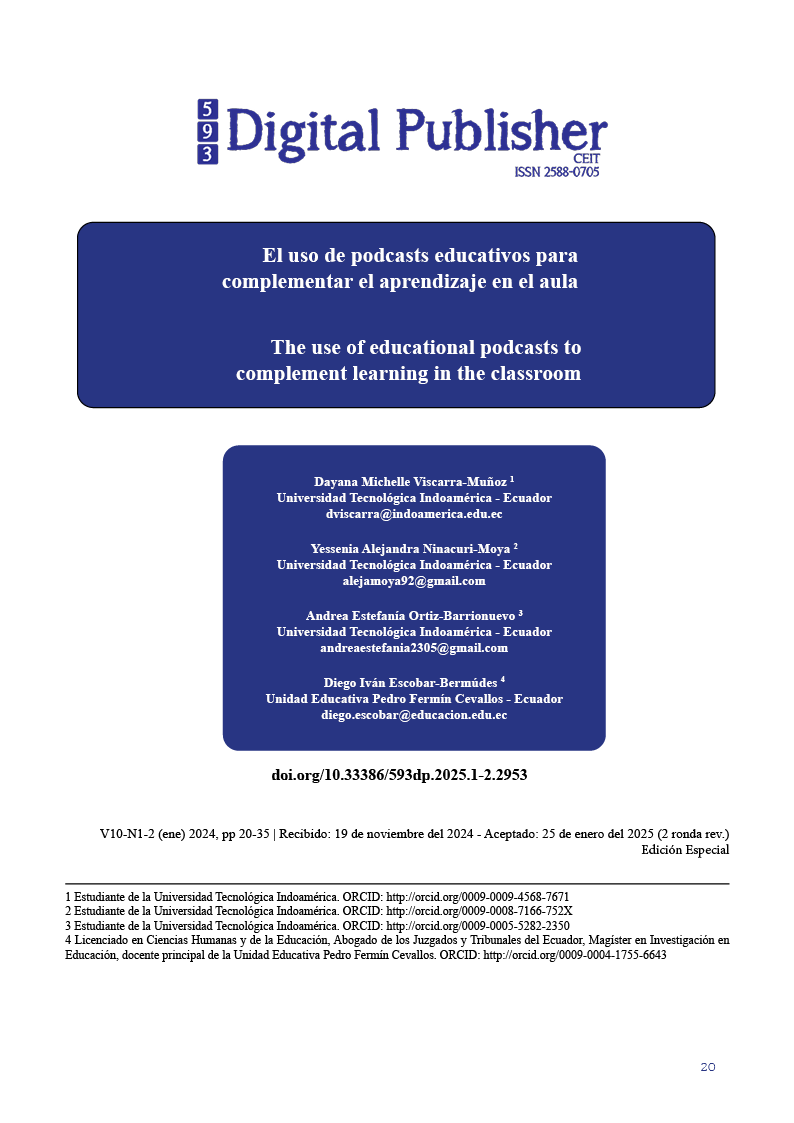The use of educational podcasts to complement learning in the classroom
Main Article Content
Abstract
Introduction: The use of educational podcasts as a complementary tool in the classroom has gained popularity due to its flexibility and accessibility. Objective: The objective is to analyze how traditional learning can be transformed through additional content that can be listened to at any time and place, promoting student autonomy and allowing teachers to diversify their teaching methods by incorporating external voices and perspectives that enrich the lessons. Methodology: The study was based on content analysis and a literature review on the use of educational podcasts and complementary technological tools. Results: The main results show that podcasts allow students to learn outside the classroom, providing additional educational content. This resource is particularly useful for reinforcing concepts, exploring additional topics, and offering different approaches to the same content. Through podcasts, teachers can expand the scope of their lessons by incorporating diverse voices and perspectives, allowing students to access information anytime and anywhere. Additionally, students can review the material at their own pace, which benefits those with different learning styles.
Conclusion: Podcasts promote the development of listening skills and oral comprehension, which are key aspects of the educational process. Their use in the classroom not only complements learning but also enhances student motivation and autonomy.
Downloads
Article Details

This work is licensed under a Creative Commons Attribution-NonCommercial-ShareAlike 4.0 International License.
1. Derechos de autor
Las obras que se publican en 593 Digital Publisher CEIT están sujetas a los siguientes términos:
1.1. 593 Digital Publisher CEIT, conserva los derechos patrimoniales (copyright) de las obras publicadas, favorece y permite la reutilización de las mismas bajo la licencia Licencia Creative Commons 4.0 de Reconocimiento-NoComercial-CompartirIgual 4.0, por lo cual se pueden copiar, usar, difundir, transmitir y exponer públicamente, siempre que:
1.1.a. Se cite la autoría y fuente original de su publicación (revista, editorial, URL).
1.1.b. No se usen para fines comerciales u onerosos.
1.1.c. Se mencione la existencia y especificaciones de esta licencia de uso.
References
Alonso, M. L. (Nina), Frederico, A., Alonso, M. L. (Nina), & Frederico, A. (2020). El rol de las bibliotecas en tiempos de COVID-19: reflexiones y propuestas. Desde El Sur, 12(1), 241–262. https://doi.org/10.21142/DES-1201-2020-0015
Andrade, F. A. T., Jiménez, E. L. J., Napa, A. L. Z., Centeno, M. V. C., Macancela, F. A. G., & Guzmán, K. X. R. (2024). Plataformas de educación en línea: innovaciones y desafíos para la enseñanza a gran escala. South Florida Journal of Development, 5(10), e4483. https://doi.org/10.46932/sfjdv5n10-010
Arabit-García, J., García-Tudela, P. A., & Prendes-Espinosa, M. P. (2021). Uso de tecnologías avanzadas para la educación científica. Revista Iberoamericana de Educación, 87(1), 173–194. https://doi.org/10.35362/RIE8714591
Barreiro Zambrano, D. M. (2020). UNIVERSIDAD TECNOLÓGICA INDOAMÉRICA. https://repositorio.uti.edu.ec/bitstream/123456789/2816/1/BARREIRO%20ZAMBRANO%20DIANA%20MARILU.pdf
Borges, R., Moll, R., & Martínez, E. (2024). Podcasting de ODS como motor de cambio en la enseñanza superior: una experiencia docente para la transferencia de conocimiento de las Universidades a la sociedad. Revista de Innovación y Buenas Prácticas Docentes, 13(1), 10–20. https://doi.org/10.21071/RIPADOC.V13I1.16130
Borja-Torresano, S. C., Mascaro-Benites, E. M., & Ulli-Flores, W. E. (2020). Motivación en el uso de podcast para el desarrollo de competencias comunicativas en el aprendizaje del idioma ingles. Dominio de Las Ciencias, 6(4), 172–197. https://doi.org/10.23857/DC.V6I4.1460
Buxarrais Estrada, M. R., & Farias, L. (2024). Pódcast y educación moral: dar la palabra a los estudiantes. Revista Internacional de Pedagogía e Innovación Educativa, 1(2). https://doi.org/10.51660/ripie.v1i2.45
Cardona, J. P., Leal, J. J., Cardona, J. P., & Leal, J. J. (2024). Evaluación del desarrollo de habilidades de modelado matemático en un curso de ecuaciones diferenciales ordinarias: un enfoque desde la ingeniería. Formación Universitaria, 17(2), 1–14. https://doi.org/10.4067/S0718-50062024000200001
Castro Monge, E., & Castro Monge, E. (2023). Factores a considerar para una educación a distancia inclusiva. Academo (Asunción), 10(1), 112–140. https://doi.org/10.30545/ACADEMO.2023.ENE-JUN.10
Castro Ramírez, L. M., & Ángel Zuluaga, L. (2020). Modelo de enseñanza ágil para el grado tercero de primaria de la institución Fe y Alegría La Paz de la ciudad de Manizales. https://doi.org/10.57998/BDIGITAL.HANDLE.001.3543
Celaya, I., Ramírez-Montoya, M. S., Naval, C., & Arbués, E. (2020). Usos del podcast para fines educativos. Mapeo sistemático de la literatura en WoS y Scopus (2014-2019). Revista Latina, 77. https://doi.org/10.4185/rlcs-2020-1454
Collantes-Lucas, A. C.-L. M. A., & Aroca-Fárez, A. E. (2024). Aprendizaje lúdico en la era digital apoyado por las TIC en niños de 4 a 5 años. MQRInvestigar , 8(2), 596–620. https://doi.org/10.56048/MQR20225.8.2.2024.596-620
Duarte León, E. G., Idárraga Arismendy, Á. J., Marín Quiroga, E. M., & Vélez Escobar, E. A. (2021). El Podcast: un recurso digital para fortalecer la expresión oral de los estudiantes de grado once del Colegio La Chucua de Bogotá. https://doi.org/10.57799/11227/1692
Ezquerro, L., Coimbra, R., Bauluz, B., Núñez-Lahuerta, C., Román-Berdiel, T., & Moreno-Azanza, M. (2024). Large dinosaur egg accumulations and their significance for understanding nesting behaviour. Geoscience Frontiers, 15(5). https://doi.org/10.1016/j.gsf.2024.101872
Fernández, J. R. D., & Taquire, C. D. C. (2022). Gamificación y herramientas tecnológicas en la enseñanza-aprendizaje de las matemáticas. Ciencia Latina Revista Científica Multidisciplinar, 6(6), 262–285. https://doi.org/10.37811/CL_RCM.V6I6.3485
Figueroa, T. L. G., Mendoza, J. R. D., & Isaac, R. M. (2023). El desarrollo de competencias comunicacionales a partir del aprendizaje basado en proyectos en los estudiantes de básica superior. Sinergia Académica, 6(Especial), 101–122. https://doi.org/10.51736/PA0JW945
FREIRE, E. P. A. (2017). PODCAST: BREVE HISTÓRIA DE UMA NOVA TECNOLOGIA EDUCACIONAL. Educação Em Revista, 18(2). https://doi.org/10.36311/2236-5192.2017.v18n2.05.p55
Gamarra, J. H. G., Escalante, C. A. C., Rivas, A. B. C., Apaza, F. M., Apaza, A. L., & Zamata, J. R. M. (2023). Capacidades de los sistemas educativos latinoamericanos para la aplicación de las herramientas digitales como el aula invertida. https://doi.org/10.31219/OSF.IO/Q5ZBX
Gómez Marín, A., Restrepo Sanata, E., Becerra Agudelo, R. A., Gómez Marín, A., Restrepo Sanata, E., & Becerra Agudelo, R. A. (2021). Fundamentos pedagógicos para la creación y producción de recursos educativos abiertos (REA). Anagramas -Rumbos y Sentidos de La Comunicación-, 19(38), 35–68. https://doi.org/10.22395/ANGR.V19N38A3
Gutierrez, L. (2023). Aprendizaje digital: estrategias y transformaciones en la educación y el aprendizaje | Editorial Internacional Alema. https://editorialalema.org/libros/index.php/alema/article/view/20
Hernández Rangel, M. de J., Nieto-Malpica, J., & Bajonero Santillán, J. N. (2021). Aprendizaje híbrido generado desde las Instituciones de Educación Superior en México. Revista de Ciencias Sociales, ISSN-e 1315-9518, Vol. 27, No. 4, 2021, Págs. 49-61, 27(4), 49–61. https://dialnet.unirioja.es/servlet/articulo?codigo=8229877&info=resumen&idioma=ENG
Ibarra, K. G. (2019). SoundCloud: Possibilities and limitations of a streaming platform for educational podcasts. Revista de Educación a Distancia, 19(60). https://doi.org/10.6018/red/60/09
Jones, R. G. (2011). (1) Tecnologías emergentes: Aplicaciones móviles para el aprendizaje de idiomas | Solicitar PDF. https://www.researchgate.net/publication/279637329_Emerging_technologies_Mobile_apps_for_language_learning
Kraus, G., Formichella, M. M., & Alderete, M. V. (2019). El uso del Google Classroom como complemento de la capacitación presencial a docentes de nivel primario. Revista Iberoamericana de Tecnología En Educación y Educación En Tecnología, 24, e09. https://doi.org/10.24215/18509959.24.E09
Montes, F. R., & Albertos, J. V. S. (2023). Posibilidades de Audacity para la realización de pódcast educativos. In Recursos digitales para la adquisición de competencias musicales en las aulas de infantil, primaria y secundaria. https://doi.org/10.2307/jj.1866738.6
Mujica Sequera, R. M. (2024). Clasificación de las Herramientas de la Inteligencia Artificial en la Educación. Revista Tecnológica-Educativa Docentes 2.0 (RTED), ISSN-e 2665-0266, Vol. 17, No. 1, 2024 (Ejemplar Dedicado a: Paradigmatic Resilience), Págs. 31-40, 17(1), 31–40. https://dialnet.unirioja.es/servlet/articulo?codigo=9580405&info=resumen&idioma=ENG
Núñez-Naranjo, A. F., Paredes Guevara, A. W., Pérez, V., & Yancha Yanca, K. R. (2021). El cuento: estrategia didáctica para la comprensión lectora. ConcienciaDigital, 4(1.2), 119–130. https://doi.org/10.33262/concienciadigital.v4i1.2.1583
Núñez-Naranjo, A., Luis-Masabanda, J., Morales-Urrutia, E., & Goitia, J. M. G. (2023). Scratch as a Tool to Promote Computational Thinking in Technological Education (pp. 525–533). https://doi.org/10.1007/978-981-99-5414-8_48
Núñez-Naranjo, A., Sinailin-Peralta, J., & Morales-Urrutia, E. (2024). Gamification: From Motivation and Challenges to Improving Academic Performance in Learning Mathematics (pp. 106–113). https://doi.org/10.1007/978-3-031-44131-8_11
Ochoa Egoavil, J. C. (2019). El uso del Kahoot y su contribución en la mejora de la habilidad de escritura del idioma inglés en estudiantes de pregrado del primer ciclo de una universidad privada de Lima. Universidad Tecnológica Del Perú. http://repositorio.utp.edu.pe/handle/20.500.12867/2441
Pacheco Baeza, M. C. (2022). proceso de formación continua para docentes de educación preescolar en México. EDU REVIEW. International Education and Learning Review / Revista Internacional de Educación y Aprendizaje, 10(3), 257–269. https://doi.org/10.37467/gkarevedu.v10.3144
Padilla, Y. Y. C. (2023). Gamificación educativa y su impacto en la enseñanza y aprendizaje del idioma inglés: un análisis de la literatura científica. Ciencia Latina Revista Científica Multidisciplinar, 7(4), 1813–1830. https://doi.org/10.37811/CL_RCM.V7I4.7011
Soto, A. D.; Murillo, J. & Perdomo, G. (2016). El Uso De Podcast Educativo Como Herramienta Use of Educational Podcast As an Innovative Tool for. EDUTEC, Revista Electrónica de Tecnología Educativa, 57.
Soto Rojas, A. D., Murillo Yañez, J., & Perdomo Sanciprián, G. (2016). El uso de podcast educativo como herramienta innovadora para el aprendizaje del italiano en el nivel empresarial. Edutec. Revista Electrónica de Tecnología Educativa, 57. https://doi.org/10.21556/edutec.2016.57.680
Venegas Alvarez, G. S. (2024). La Comunicación Y El Whatsapp, La Práctica Discursiva De Los Estudiantes Universitarios Ecuatorianos. https://doi.org/10.37811/CLI_W1104





